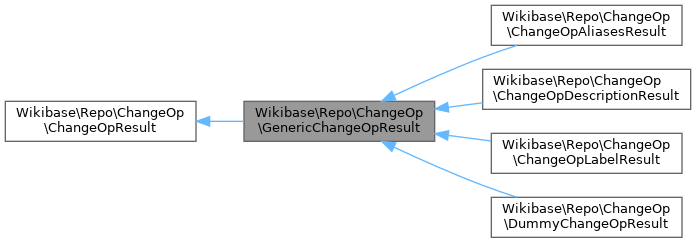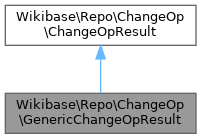Holds only generic info on whether entity was changed or not. More...
 Inheritance diagram for Wikibase\Repo\ChangeOp\GenericChangeOpResult:
Inheritance diagram for Wikibase\Repo\ChangeOp\GenericChangeOpResult: Collaboration diagram for Wikibase\Repo\ChangeOp\GenericChangeOpResult:
Collaboration diagram for Wikibase\Repo\ChangeOp\GenericChangeOpResult:Public Member Functions | |
| __construct (?EntityId $entityId, bool $isEntityChanged) | |
| getEntityId () | |
| The id of the entity document that the change op was applied to. | |
| isEntityChanged () | |
| Whether the entity document was actually changed in any way as a result of applying the change op to it. | |
| validate () | |
| Validate a ChangeOpResult. | |
Private Attributes | |
| $entityId | |
| $isEntityChanged | |
Detailed Description
Holds only generic info on whether entity was changed or not.
- Copyright
- GPL-2.0-or-later
Constructor & Destructor Documentation
◆ __construct()
| Wikibase\Repo\ChangeOp\GenericChangeOpResult::__construct | ( | ?EntityId | $entityId, |
| bool | $isEntityChanged ) |
Member Function Documentation
◆ getEntityId()
| Wikibase\Repo\ChangeOp\GenericChangeOpResult::getEntityId | ( | ) |
The id of the entity document that the change op was applied to.
- Returns
- EntityId|null
Implements Wikibase\Repo\ChangeOp\ChangeOpResult.
◆ isEntityChanged()
| Wikibase\Repo\ChangeOp\GenericChangeOpResult::isEntityChanged | ( | ) |
Whether the entity document was actually changed in any way as a result of applying the change op to it.
- Returns
- bool
Implements Wikibase\Repo\ChangeOp\ChangeOpResult.
◆ validate()
| Wikibase\Repo\ChangeOp\GenericChangeOpResult::validate | ( | ) |
Validate a ChangeOpResult.
Mostly suitable for validations that need to run only on the parts that have been actually changed on an entity. Example of those are expensive validations that need to run on db or other external slower types of stores.
For simpler and less-expensive validations, ChangeOp::validate can be used as well.
Concrete example: Checking for uniqueness of terms (fingerprint) across the store is an expensive operation. It better be checked only on terms that are actually going to change on entity, rather than validate uniqueness on all terms including the ones that are not changed.
- Returns
- Result
Implements Wikibase\Repo\ChangeOp\ChangeOpResult.
Member Data Documentation
◆ $entityId
|
private |
◆ $isEntityChanged
|
private |
The documentation for this class was generated from the following file:
- repo/includes/ChangeOp/GenericChangeOpResult.php

